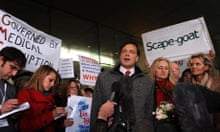The Lancet today finally retracted the paper that sparked a crisis in MMR vaccination across the UK, following the General Medical Council's decision that its lead author, Andrew Wakefield, had been dishonest.
The medical journal's editor, Richard Horton, told the Guardian today that he realised as soon as he read the GMC findings that the paper, published in February 1998, had to be retracted. "It was utterly clear, without any ambiguity at all, that the statements in the paper were utterly false," he said. "I feel I was deceived."
Many in the scientific and medical community have been pressing for the paper, linking the MMR (measles, mumps and rubella) jab to bowel disease and autism, to be quashed. But Horton said he did not have the evidence to do so before the end of the GMC investigation last Thursday.
In 2004, when concerns were first raised about the conduct of the study, the Lancet asked the Royal Free hospital, where Wakefield and his fellow authors worked, to investigate. But Professor Humphrey Hodgson, then vice-dean of the Royal Free and University College school of medicine, wrote to the journal to say it had found no problems. "We are entirely satisfied that the investigations performed on children reported in the Lancet paper had been subjected to appropriate and rigorous ethical scrutiny," he said at that time.
The GMC last week disagreed. Children had been subjected to invasive procedures that were not warranted, a disciplinary panel ruled. They had undergone lumbar punctures and other tests solely for research purposes and without valid ethical approval.
Wakefield "was dishonest", said Horton. "He deceived the journal." The Lancet had done what it could to establish that the research was valid, by having it peer-reviewed. But there is a limit, he said, to what peer-review can ascertain.
"Peer review is the best system we have got for checking accuracy and acceptability of work, but unless we went into the lab or examined every case record, we can't ever finally rule out some element of misconduct. The entire system depends upon trust. Most of the time we think it works well, but there will be a few instances – and when they happen they are huge instances – where the whole thing falls apart."
When journals have suspicions of fraud or misconduct, they have to refer them to the institution employing the scientists. "We rely on the processes within institutions to investigate allegations of fraud, and if they are found to be wanting, that is extremely disappointing," he said.
Dr Michael Fitzpatrick, author of books on the MMR scare, said the retraction was "good news – only 10 years too late".




Comments (…)
Sign in or create your Guardian account to join the discussion